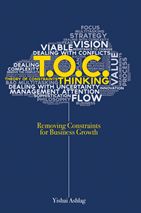Yishai Ashlag is probably an author of whom you have not (yet) heard. He is the son-in-law of the late Eliyahu Goldratt, originator of the Theory of Constraints approach to management. If you are interested in creating sustainable growth for your business enterprise—no matter what size it is today—then I hope you will not forget this name.
 His recent book, T.O.C. Thinking, is full of sage advice. Allow me to give you just a taste:
His recent book, T.O.C. Thinking, is full of sage advice. Allow me to give you just a taste:
When we think about business growth we tend to focus our attention on a new big idea, a new vision as a path to success. Then, full of enthusiasm, we charge forward to pursue this vision. But most often this is not the way to start. The starting point of this quest is not moving forward with things we should do, but rather stop doing the things we should not do.
Our organization is already preoccupied with many initiatives that are not necessarily promoting us in our quest for successful growth. Some of these initiatives may even be holding us back. So starting by launching more grand initiatives is probably not the best idea. The first step in the process of creating harmonious growth is to examine our rituals, behaviors and activities in order to identify the ones that exhaust our time and energy without getting us closer to our goal. We need to look for the policies and processes that make us, as managers, very frustrated. [Emphasis added.]
Ashlag, Yishai. T.O.C. Thinking - Removing Constraints for Business Growth. Great Barrington, MA: North River Press, 2014.
The first step
Yes, indeed! The first step should be to examine where we are and what we do today.
You would be surprised—or, perhaps not—how many small to midsized businesses with which we come in contact on a day to day basis that have never really stopped their headlong rush into day to day activities long enough to consider how what they are doing got them to where they are today.
Oh, sure. Their ownership and management team have open eyes and are more than willing to tell you about how this success and that success have led them to their present level of achievement.
Nevertheless, they are much less open-eyed—or, at least, far less candid—about how they have been unable to overcome hurdles to growth, or how some aspects of their production just never seem to smooth themselves out, no matter what they try.
For some reason, most executives and managers tend to think that they must somehow "build on what we have today," without ever really taking time to consider just how good the foundation of what they have today really is. They seem to believe that incremental change from what exists today is the only way forward.
Rituals
"Ritual" seems like, perhaps, too strong a word for Ashlag to use in this case. But, I don't believe it is.
The word "ritual" comes from "rite" which is defined as "a formal or ceremonial act or procedure prescribed or customary in religious or other solemn use."
Yes. I have seen such procedures prescribed for solemn use at work in companies—and to the companies' detriment.
I have been told, for example, that supply chain folks in a particular firm were to always buy from the lowest cost supplier.
When I ask, "Why? What about the effects of longer lead-times, or poor quality, on the firm's ability to produce throughput or sustain growth?"
I was told, "That's the way the owner said it's to be done. He always did it that way when he was overseeing the buying, and it was successful for him." (Never mind that the last time the owner was issuing purchase orders was 15 years ago.)
Tribal Knowledge
The term "rituals" goes right along with a term we have been using right here: "tribal knowledge." If you have read many of our articles, you will recognize the term.
We use it to describe all of the knowledge that is resident in the organization's people, but is nowhere captured or codified in systems or documents (like training manuals or written procedures).
Following the example above: I am pretty much certain that there was no written guideline anywhere in the organization I am thinking of that said, "You shall only purchase raw materials from the lowest-cost source."
However, if anyone was ever called on the carpet and reprimanded for buying products from other than "the lowest-cost source," you can be pretty sure that word got around. It became circulate "tribal knowledge." Nobody ever needed to put it an written manual anywhere. It became "a ritual" to always buy from the lowest-cost source.
Exhausting time and energy (and money)
Supply chain and other corporate managers and executives really need to take a look at "the rituals, behaviors and activities" that are wearing them out while producing virtually no positive effect—and, perhaps, significant negative effects—on the firm's ability to produce profitable growth. If the firm is stagnating in growth and profits, all the more reason to take a long, hard look into these matters.
But few firms are well-equipped to make such an examination. The firm's managers and executives are, as the old saw goes, "can't see the forest for the trees." These folks tend to examine situations "tree by tree" without ever getting back far enough to look at the entire eco-system in which the firm functions.
Sometimes it just takes outside eyes and a systematic approach for unlocking "tribal knowledge" to get them headed in the right direction again.



